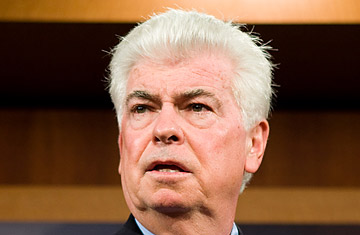
Senator Chris Dodd
Correction Appended: March 11, 2009
In many respects, Senator Chris Dodd is more powerful than ever on Capitol Hill these days. After enduring eight years in the political wilderness, the Connecticut Democrat is one of his ascendant party's senior statesmen, someone who endorsed Barack Obama early on in the presidential campaign and who hails from a solidly blue state. As chairman of the Senate Banking Committee, Dodd has played a central role in shepherding much of Obama's economic agenda, from the second half of the bank bailout to the coming overhaul of regulations governing Wall Street. With his good friend Ted Kennedy sidelined with brain cancer, Dodd has stepped in to help take a lead role on health-care reform. In fact, at one point earlier this year, before the Inauguration, Dodd was de facto chairman of Kennedy's Health, Education, Labor and Pensions Committee as well as Joe Biden's Foreign Relations Committee.
At the same time, Dodd is looking increasingly vulnerable. The silver-haired father of two young girls is facing his toughest re-election fight ever, and he doesn't even have an opponent yet. (CNBC pundit Larry Kudlow and former GOP Representative Rob Simmons have both expressed interest in running.) In a January Quinnipiac poll, 51% of Connecticut voters said they would not vote for Dodd in 2010. "It's the subject matter — people are watching their tax dollars go into institutions and they wonder when it's going to get better and they wonder where it's going," Dodd says. "I don't find people trying to elbow me out of the way trying to take over jurisdiction of the Banking Committee." (See who's who in Obama's White House.)
Much of Dodd's current woes stem from a pair of mortgages that he must wish he had never gotten. His reputation has not recovered from the allegation last year that he received a sweetheart deal on his mortgage, saving upwards of $75,000 courtesy of Countrywide, one of the biggest pushers of the subprime mortgages that have landed the U.S. economy in such dire straits. Connecticut officials say there is no evidence of wrongdoing, and Dodd, who has allowed reporters limited access to his mortgage documents, denies he got any preferential treatment and insists he is going to refinance with a different bank. (Dodd allowed reporters one-time access to hundreds of pages of his mortgage documents. Reporters were not allowed to copy or photograph the documents and staff remained present throughout the viewing). "I made the mistake of not addressing it earlier," Dodd concedes. Still, he will not allow reporters to deeply examine the "hundreds of pages" of mortgage documents, saying, "No one has ever showed as much as we have." But the scandal has left a bad taste with Connecticut voters; in the Quinnipiac poll, 56% said the Countrywide connection made them less likely to vote for Dodd.
Dodd's decision to move his family to Iowa in 2007 to lay the groundwork for what would end up a short-lived presidential campaign didn't endear him to his constituents either. "How can he identify himself as D-Conn. when he lives in Iowa?" asked a Connecticut Post editorial at the time. In the Quinnipiac poll, Dodd's approval ratings came in at a dismal 41%; that makes him even less popular than Joe Lieberman, the independent junior Senator who left the Democratic Party after losing his primary race and then crossed what was left of his party lines to endorse John McCain for President. "It's a legitimate question to ask; I'm certainly aware of [the polls]," Dodd says. "But my answer to it is: do your work. And look, that stuff last fall was terribly unpopular — the banking things, the assistance to the automobile institutions. We have never seen mail or e-mails so hostile to those ideas ... But it was the right thing to do."
Yet all of this has accrued to support a general perception that Dodd, who's serving his fifth term in the Senate, "has kind of lost touch with voters," says Jennifer Duffy, who tracks Senate races for the nonpartisan Cook Political Report and rates Dodd among the most vulnerable Democrats up for re-election.
Dodd's aides point to Obama's dominant 61% victory in Connecticut in an election that saw the defeat of the state's (and New England's) lone House Republican, Chris Shays. "Connecticut is trending blue. Even if Dodd only got 70% of Obama's voters, he'd still easily win," says one adviser. "His potential opponent Rob Simmons couldn't even hold Connecticut's Second District — how is he going to win statewide?"
Still, the double distraction of a looming re-election battle and the ongoing health-care talks has some worried that Dodd might be neglecting the Senate Banking Committee at a crucial time, or at least be stretched too thin. "Health care is yet another distraction on the list of things that have distracted Dodd from his [Banking] Committee work," says one Republican Senator who has served with Dodd on the committee. "Legislation to regulate the insurance industry and to crack down on Fannie Mae and Freddie Mac languished before the committee while he was on the campaign trail. Then Countrywide distracted him from the housing bill, a bill that had to be overhauled by the Obama Administration this week," the Senator says, referring to the Administration's changes to the housing program created by Dodd's bill last summer. The changes, which did not require congressional approval, were badly needed to loosen up the $300 billion fund that had been choked by conditions Congress placed on the money. "We created a bill that did a lot of good things but made it cumbersome to deal with foreclosures," Dodd concedes, adding that his committee held 82 hearings "on the foreclosure issue" in the 110th Congress.
